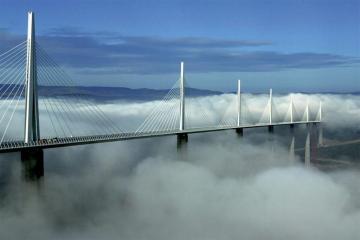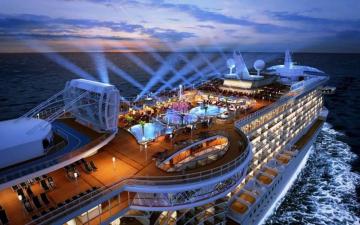Top 10 – Europe Party Cities
Discover the vibrant nightlife scenes of Europe's most fascinating cities and travel to remember-able destinations! From the vibrant beauty of London to the thrilling energy…


Parga, a Greek city situated on the Ionian Sea, is a destination that enthralls visitors from the moment they arrive. Located in the northwest of Greece, Parga is distinguished by its unique architecture, breathtaking beaches, and rich tapestry of history all of which are mirrored in the brilliant blue hues of the Ionian Sea.
Parga is sometimes known in the annals of history as the “Bride of Epirus.” Its narrow, amphitheater-shaped lanes, which snake through an interminable series of olive orchards, provide its appeal. The city seems to be immersed in the azure waves of the Ionian Sea based on its location among high mountains surrounded in rich greenery.
Adding a whimsical element to the Mediterranean-style architecture, local rules dictate that the façade of the old town be vividly yellow and red. The homes are so closely packed that one may momentarily forget one is in Greece and instead enjoy Lisbon’s lovely streets.

Parga’s past is as colourful as its buildings. Born in this city was Ibrahim Pasha, among the most well-known Grand Vizier of the Ottoman Empire. Born June 27, 1493, Ibrahim Pasha was the son of Orthodox Greek fisherman Theo. He was taken to Manisa, a Turkish city, when a small child. A wealthy widow bought him and provided him with a thorough education including texts by astrologers, Arab mathematicians, and Greek thinkers. In other languages including Greek, Turkish, Persian, Italian, and Serbian, he developed mastery; he also had extraordinary musical ability. His extraordinary intellectual ability and thorough education helped him to climb the Ottoman Empire’s hierarchy quickly, so becoming the second highest level of power, exceeded only by the Sultan.
Though Turkish historians applaud Ibrahim Pasha, his influence in Greece is generally unknown. His fame is built in Istanbul instead of his own Parga since he carried military operations in favor of the Turks instead of the Greeks. Reports state that the only proof he left in Parga may be found in the old registry books.
Another powerful commander, Ali-pasha Janjinski (1740–1822), built a castle on top of the hill giving a commanding view of the city, so profoundly affecting Parga. Now a well-known tourist destination, this fortitude bears evidence of Ali Pasha’s authority. Born in Albania, Ali Pasha was a tough and pragmatic leader who developed ties to everyone who would help him keep control over the territory, including Napoleon I Bonaparte and the United Kingdom. Poet Lord George Gordon Byron paid Ali Pasha’s court in Ioannina 1807. The pasha’s riches really amazed him, but his excessive harshness terrified him as well.

Perched on a mountaintop with a view of the Ionian Sea, Parga’s massive fortification is more than just a set of worn-through stones. It is a living tribute to the turbulent past of the city, a poignant reminder of the resiliency of the human spirit, and a mute observer of the fall and rise of civilizations.
Originally built in the 13th century, the fortress served as a strong fortification against an unrelenting wave of attackers. Each Venetian, French, English, Turkish, wrote their aspirations into the fort’s walls. For Parga, the English decision to surrender the city to the Ottoman Empire would prove to be pivotal in 1817. Nearly all of Parga’s 4,000 citizens fled to the nearby island of Corfu in quest of safety from the approaching Turkish control, therefore triggering a mass migration from this act of treason.
For almost a century, the fortification watched over an abandoned city silently, its walls echoing the spirits of a vivid past. But Epirus, which included Parga, was freed in 1913 with Greek triumph in the Balkan Wars. Returning to their native country were the Pargians who had been banished; their souls were bursting with both fear and hope.
When they got back, they were greeted with a mix of shame and grief. Incorporating a harem into their sacrosanct territory, Ali Pasha, the notorious Ottoman king of Epirus, had desecrated it. Removing stones from the fortress walls, the Pargians started the demolition of the harem out of a flash of righteous indignation.
Notwithstanding its marks and weathering, the fortitude endured in spite of this act of disobedience. For visitors from all around the world, it is still a beloved pilgrimage site. They go to see the panoramic views, follow the lines of its remarkable past, and honor the unwavering Pargian spirit that, in spite of all challenges, returned to take back their own country.

Greece, a country rich in religious history, offers a lot of holy areas meant for reflection and meditation. Not an exception to this spiritual riches is Parga, a little beach town in the Epirus region. With an amazing collection of 50 churches and monasteries scattered over its terrain, Parga is a haven for anyone seeking spiritual comfort and connection to the divine.
Attracting both locals and visitors, the Church of St. Nicholas is a cherished lighthouse of religion right in Parga. The city’s revered monument is the result of its calm ambiance and elegant architecture that inspire respect and peace.
Still, Parga has spiritual riches beyond of its land borders. Just 70 meters offshore from the city coast, Mother of God’s Island is a small island that hides great relevance. On this islet sits the Church of the Most Holy Mother of God, a sanctuary that has particular place in the souls of the Pargians.
Held on the pristine Mother of God’s Island, the well-known Parga summer festival is a joyful celebration of faith and culture drawing crowds of people every year. Still, its appeal goes beyond the holidays. Couples are drawn to the island’s romantic concept of arriving by boat to exchange vows in the hallowed halls of the church, therefore making it a most sought-after wedding site.
Whether the Church of St. Nicholas or the little charm of the Church of the Most Holy Mother of God, Parga’s spiritual havens offer a haven for the soul, a place to interact with the divine and find consolation in the embrace of religion.

Jewel situated on the Ionian shore, Parga is a place meant to fulfill the most discerning visitor’s needs and wishes. Parga provides a broad spectrum of experiences including gastronomic delights, adventure, leisure, and cultural immersion.
Parga’s beaches appeal to sun worshippers as well as sea enthusiasts. One famous example of an immaculate length of golden sand caressed by glistening clean waves is Valtos Beach Visitors could enjoy the Mediterranean sun, cool dip in the sea, or range of water sports.
The gastronomic scene of Parga is a seductive tapestry of tastes and smells. There is something to fit every taste from trendy eateries with creative fusion cuisine to classic Greek tavernas serving moussaka and souvlaki. For those with a sweet taste, the city’s pastry shops and bakeries are a real delight since they abound in mouthwatering delicacies.
For shoppers, Parga is a retail heaven. Well-stocked supermarkets, chic boutiques, and souvenir stores offering locally made handicaps abound in the city’s appealing streets. You will find the most latest fashion trends as well as a unique memento from your trip right in Parga.
Parga takes on a vibrant center of nighttime activity as the sun sets. Bars, discos, and live music venues bring to life a great range of entertainment possibilities. Parga’s nightlife culture has something for everyone, whether your taste is for elegant lounge drinks or pulsing rhythms danced the night away.
Parga is also quite good at providing visitors with basic services. A post office, ambulance service, and pharmacy all fairly provide your needs for health and safety. For individuals who want to look about the area, automobile and motorcycle rental companies offer easy way of mobility. Apart from that, the city’s promenade with cafes and restaurants provides a lovely setting for unhurried walks and outdoor dining.
Every day in Parga offers chance for exploration and enjoyment. Whether your preferred method of relaxation is on its perfect beaches, on a gastronomic excursion, on retail therapy, or on its energetic nightlife, Parga promises an amazing experience. In every sense, this is the refuge of a tourist.
Imagine that your favorite beach until next year will be destroy by erosion, concrete or…
Home Greece is a popular destination for those seeking a more liberated beach vacation, thanks…
Discover the vibrant nightlife scenes of Europe's most fascinating cities and travel to remember-able destinations! From the vibrant beauty of London to the thrilling energy…

The 7 Wonders of the 21st Century feature amazing successes redefining human creativity and engineering capability. From the calm Temple of Buddha's Origin in Leshan,…

Millions of visitors come to Spain annually because of its vibrant culture, fascinating past, and amazing scenery. Still, the real spirit of Spain is found…

From Rio's samba spectacle to Venice's masked elegance, explore 10 unique festivals that showcase human creativity, cultural diversity, and the universal spirit of celebration. Uncover…

Boat travel—especially on a cruise—offers a distinctive and all-inclusive vacation. Still, there are benefits and drawbacks to take into account, much as with any kind…

© All Rights Reserved. By Travel S Helper